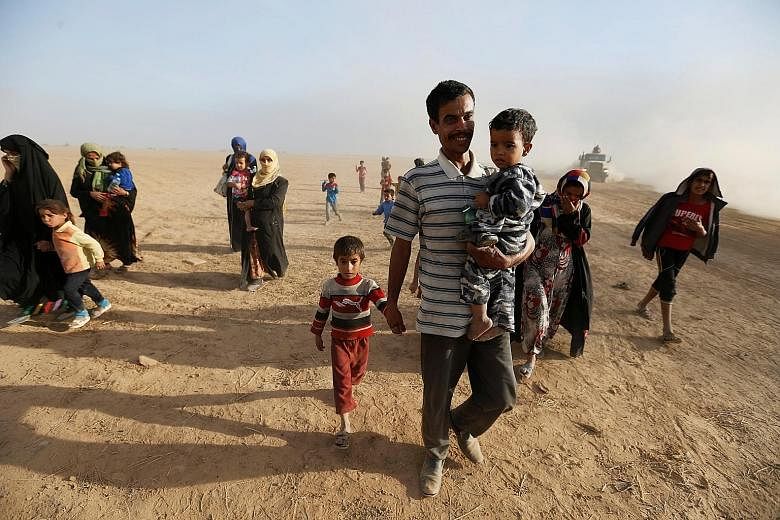MOSUL • A week into a massive multi-pronged offensive to dislodge the Islamic State in Iraq and Syria (ISIS) from Mosul, its last major stronghold in Iraq, reports are trickling out about human shields and executions.
An Iraqi intelligence source told CNN that ISIS executed 284 men and boys late last week.
Those killed on Thursday and Friday had been rounded up near and in the city for use as human shields against attacks that are forcing ISIS out of the southern sections of Mosul, the source said.
They were all shot dead at the city's defunct College of Agriculture and a bulldozer then dumped the bodies in a mass grave there, the source added.
Those who tried to flee ISIS-held territory were also not spared.
-
284
Number of men and boys that ISIS executed late last week, according to an Iraqi intelligence source who spoke to CNN.
550
Number of families that militants had taken around Mosul and were probably holding as human shields, said the United Nations High Commissioner for Refugees.
One survivor, 28-year-old Hassan, said he saw his friends killed by the militants.
"(ISIS) killed two of my best friends in the most horrible way because they tried to escape to territory held by the Iraqi security forces," he told the International Organisation for Migration in an account reported by the BBC.
"(They) hit their heads against the roof of the car until they didn't resist any more, and then lined them up and shot them," said Mr Hassan, who also said that the militants had used him as a shield.
"(They) would force us to go play football with them, because they knew that when they were among civilians, the planes would not target them. So they would force us to go to different places with them," he added.
Mr Younis Ali, 20, lost his four brothers and five sisters to ISIS, Reuters reported.
"I have learnt that they tried to take one brother as a human shield," he said of ISIS fighters who had ruled his village of Qayyara, near Mosul, until last week.
"When he resisted, they shot him dead. But another brother was also killed when he tried to prevent his death," said Mr Ali, whose mother had informed him of the tragedy.
"And then another brother tried to hug the one who was shot and the same thing happened and they were all shot dead."
Mr Ali said the militants also took his five sisters away.
On Friday, the United Nations High Commissioner for Refugees said the militants had taken 550 families from villages around Mosul and were holding them near ISIS locations in Mosul, probably as human shields.
Ms Thaiban Sulaiman Ali recalled how her two brothers and two uncles and a total of 10 people in her immediate family were taken hostage by ISIS.
"Sixteen members of my extended family have been taken as human shields or hostages by Daesh," she said, using the Arabic acronym for ISIS. "And they also blew up some of our homes."
Housewife Amra Ali is an example of how ISIS engaged in hostage-taking and kidnapping even before the Mosul battle began last Monday. The 30-year-old was detained for 40 days four months ago because her husband is a member of a Shi'ite militia that has led the fight against ISIS.
"They told me when I was jailed in a house that was converted to a prison that they would hold me until my husband gives himself up," she said. "When he didn't surrender, they took me to one of their Islamic courts and they declared us divorced."
With winter looming, the United Nations and aid groups have already warned that the battle to retake Mosul - where more than one million people are still trapped - and the predicted exodus could spark Iraq's worst humanitarian emergency in years.
Those still in the city reported that the streets were mostly empty, with ISIS fighters having either fled or moved to the front lines to defend outer villages from the approaching security forces, according to a New York Times report.
They also spoke of growing fear as ISIS clamped down on residents.
Food is running scarce, and being caught using a cellphone to communicate with the outside world can bring severe punishment, even execution.
The militants have also been trying to stoke the sectarian fears of the Sunni Arab population, gathering residents to watch propaganda videos showing Shi'ites - who dominated the Iraqi security forces - abusing Sunnis, residents said.

